Alias Nick Beal

Brief Synopsis
Cast & Crew
John Farrow
Ray Milland
Audrey Totter
Thomas Mitchell
George Macready
Fred Clark
Film Details
Technical Specs

Synopsis
After criminal Frankie Faulkner unsuccessfully tries to blackmail honest district attorney Joseph Foster into allowing indicted crime boss Hansen to go free, Joseph convinces juvenile delinquent Larry Price to join the boys' club, of which he is a sponsor. Joseph vows to Rev. Thomas Garfield, who runs the club, that he would "sell his soul" to convict Hansen, and later he is summoned by a stranger, Nick Beal, to a disreputable wharfside café known as the China Coast. The seemingly omniscient and immaculately dressed Nick gives Hansen's account books, which purportedly had been burned, to Joseph, who is unaware that Nick is actually the Devil. Joseph, who considers himself incorruptible, reluctantly accepts the books because of his overwhelming desire to convict Hansen. After Hansen is convicted, Joseph confesses to his steadfast wife Martha that he stole the books, and she urges him to remain honest. That night, a committee of Joseph's friends, which includes Judge Hobson, Rev. Garfield and Paul Norton, seek to nominate Joseph for governor. Joseph is flattered by their confidence, but becomes troubled when Nick mysteriously appears in his library with a $25,000 check for his campaign. Despite Martha's protests, Joseph keeps the check, adding Nick to his growing list of debts. That night outside the café, Nick coaxes prostitute Donna Allen into working for him by providing her with a luxurious apartment and clothes. Donna soon appears at the boys' club posing as a benefactor, and later works on Joseph's gubernatorial campaign. Under Nick's influence, Joseph changes into a vain, selfish and greedy politician. Now completely indebted to Nick, Joseph accepts a pact with Faulkner to get himself elected, then becomes estranged from Martha when she suggests that it would be worth losing the governorship to preserve his integrity. Nick coaches Donna on how to seduce Joseph, but when everything occurs exactly as Nick had outlined, she becomes unnerved and tries to leave town, but is stopped by Nick. Although Joseph wins the election, his disappointed friends renounce their connection with him after learning about his deal with Faulkner. Only Rev. Garfield remains supportive, and reveals to Joseph his suspicions that Nick is the devil Lucifer. Joseph then attempts to reunite with Martha, who offers to sell their home in order to repay Nick. Nick, however, materializes with news that Hansen's bookkeeper, Finch, who had recently come to see Joseph, has been murdered. After Joseph is implicated in the murder because one of his pipes is found on Finch's body, Nick offers to help Joseph clear his name if he signs a contract giving Nick the state seal. If he refuses, Nick will send Joseph to the island of Armus Pardidas. Joseph seems to acquiesce when he allows Nick to help him evade inquisitive police, but after Joseph is inaugurated, he publicly admits to fraud and resigns from the governorship. Nick reminds Joseph about the forfeit clause in his contract, and arranges to meet him at the café that night. Before going, Joseph confides in Rev. Garfield, who is unable to find any island named Armus Pardidas on a map, and postulates that it is the island of lost souls. He then insists that because Joseph has expiated his sins by renouncing the governorship, he is no longer answerable to Nick's contract, and urges Joseph to return to his wife. Nick commandeers Joseph's taxi, however, and drives him to the wharf. Martha and Rev. Garfield follow them, and when Nick allows the reverend to inspect the contract, Rev. Garfield drops his Bible on top of it. Joseph then tucks the contract inside the Bible, and Nick, unable to withstand the power of God, backs off and disappears into the fog. Having won his battle with Lucifer, Joseph reunites with Martha.

Director
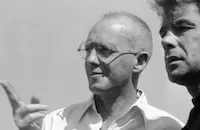
John Farrow
Cast

Ray Milland

Audrey Totter

Thomas Mitchell
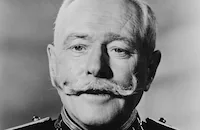
George Macready
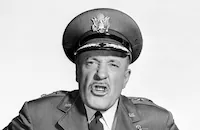
Fred Clark

Geraldine Wall
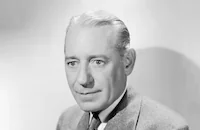
Henry O'neill

Darryl Hickman

Nestor Paiva

King Donovan
Charles Evans
Erno Verebes

Douglas Spencer
Arlene Jenkins
Pepito Perez
Joey Ray
Ray Dolciame
Michael Clifton
James Davies
Geraldine Jordan
John Shay
Ethan Laidlaw
Lester Dorr
Alyn Lockwood
Bill Sheehan
Orley Lindgren

Douglas Spencer
Billy Snyder
Stuart Holmes
Joe Whitehead
Theresa Harris
Diana Mumby
John Sheehan
Richard Kipling
Julia Faye
Frances Morris
Donya Dean
Helen Chapman
Charles Flickinger
Edward Biby
Gil Johnston
Everett Glass
Frank Darien

Elaine Riley
Jean Marshall
Louise Saraydar
Diane Stewart

Bess Flowers
Al Ferguson
Joey Ray
James Cornell
Ralph Montgomery
Frank Mayo
Pat O'malley
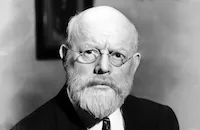
Howard Mitchell
Allan Douglas
Jerry James
Jean Ruth
Jimmie Dundee
Tim Ryan
Steve Pendleton
Robert Coleman
Sid Tomack
Pat Phelan
Stuart Holmes

Harold Vermilyea
Virginia Whitmire

James Burke
Don Shelton
Percy Hilton
Robert R. Stephenson
Philip Van Zandt
Kippee Valez
Maxine Gates
Bret Hamilton
Ben Mantz
Tom Dugan
Howard Gardiner
Weldon Heyburn
Jack Gargan
Crew
Del Armstrong
Franz Bachelin
Endre Bohem
Sam Comer
Francisco Day
Mary Kay Dodson
Ross Dowd
Hans Dreier
Gene Garvin
Stanley Goldsmith
Ed Henderson
Ted Larson
Jonathan Latimer
Lionel Lindon
Mindret Lord
Gail Mcgarry
Charles Morton
John Murphy
William Rand
Merle Reeves
Charles Sickler
Eda Warren
Franz Waxman
Wally Westmore
Stanley Williams
Philip Wisdom

Videos
Movie Clip



Hosted Intro
Film Details
Technical Specs

Articles
Alias Nick Beal
You could call Alias Nick Beal a morality play by way of film noir. Based on a story by Mindret Lord titled "Dr. Joe Faust," it's directed by John Farrow, who guided Milland through the noir classic The Big Clock (1949), and scripted by hard-boiled crime novelist Jonathan Latimer, a regular Farrow collaborator who wrote The Big Clock and The Night Has a Thousand Eyes (1948), another film noir that tipped into the supernatural. Cinematographer Lionel Linden contrasts Foster's busy, well-lit world with the shadowy atmosphere of Beal's presence as he tempts Foster, and he turns the waterfront set into a world literally lost in the fog for Beal's entrance and exit. And it proves the old acting adage "It's always more fun to play the villain." Milland won an Academy Award playing an alcoholic struggling with his demons in The Lost Weekend (1945) but was more often a romantic lead than a tormented protagonist and, at least at this point of his career, rarely a bad guy. He seems to relish the opportunity to inhabit such a commanding figure, playing the role with a dark charm, a suggestion of menace behind the cultured voice and intense eyes, and a sinister sense of humor to his temptations and manipulations.
Farrow was not necessarily well-liked by many of his actors--Milland described him as "the most disliked man at Paramount"--but he and Milland got along well. "Farrow was very good for me and very good with me," he told interviewer Barrie Pattison. Alias Nick Beal was the third of four pictures they made together. According to Milland, Farrow even incorporated some of his suggestions such as building the waterfront set so all the planes were out of true, "kind of cockeyed."
Paramount borrowed Audrey Totter from MGM for the role of the fallen woman transformed into a seductress by Beal. She had played femme fatales in Lady in the Lake (1947) and The Unsuspected (1947) but her character here is less icy and more ambivalent. Totter recalled the film fondly years, calling it a happy set, and she considers it one of "the best pictures I made."
Douglas Spencer, who has a small role as mob accountant Henry Finch, is known to film buffs as the reporter in The Thing From Another World (1951) and for supporting roles in Shane (1953) and The Diary of Anne Frank (1959), but along with scores of bit parts and uncredited appearances he was Milland's stand-in for decades. Milland rewarded his service with small parts in a number of his films.
"I consider the best picture I have ever made to be Alias Nick Beale," Farrow proclaimed in an interview years later. "This was a film made with both inspiration and honesty.... I said what I wanted to say, and the way I wanted to say it, without any studio interference." At least until the film was finished. Farrow and screenwriter Latimer called their film The Dark Circle. After seeing the finished film, recalls Farrow, "Paramount's New York office lost heart. They changed the ending and the title and then advertised it to fit its new name." The film was promoted as a straight crime thriller and, despite good reviews (the New York Times review, attributed simply to T.M.P., described it as "an arresting, expertly tuned morality drama calculated to hold attention the while it drives home a pointed lesson about the dangerous consequences of pride, greed and lust for power"), it didn't make much of a ripple in the U.S. Its reputation grew over the years, fueled in part by its rarity; Paramount never released the film to home video and it was rarely shown on TV. It makes Alias Nick Beal one of the most sought-after classics of its era.
Sources:
Femme Noir: Bad Girls of Film, Karen Burroughs Hannsberry. McFarland, 1998.
Wide-Eyed in Babylon, Ray Milland. William Morrorw & Company, 1974.
The Devil on Screen: Feature Films Worldwide, 1913 through 2000, Charles P. Mitchell. McFarland, 2010.
Dark City Dames: The Wicked Women of Film Noir, Eddie Muller. Regan Books, 2001.
Films Famous, Fanciful, Frolicsome & Fantastic, John Reid. Lulu.com, 2006.
AFI Catalog of Feature Films
"Morality Drama at the Paramount," movie review by T.M.P. The New York Times, March 10, 1949.
IMDb
By Sean Axmaker

Alias Nick Beal
Quotes
Trivia
Notes
The working titles of this film were The Strange Temptation, Dark Circle and Alias Nicky Beal. Mindret Lord's original story was titled "Dr. Joe Faust," referring to the legendary figure of Johann Faust, a 16th century German magician and astrologer who was immortalized in fiction, beginning with Doctor Faustus (1587) by Johann Spiess. According to the legend, Faust sold his soul to the Devil in exchange for worldly knowledge and power. Both Kippee Valez and Maxine Gates were listed in the role of "Josie." It is not known whether one replaced the other, or if one appeared in the picture in a different role.















